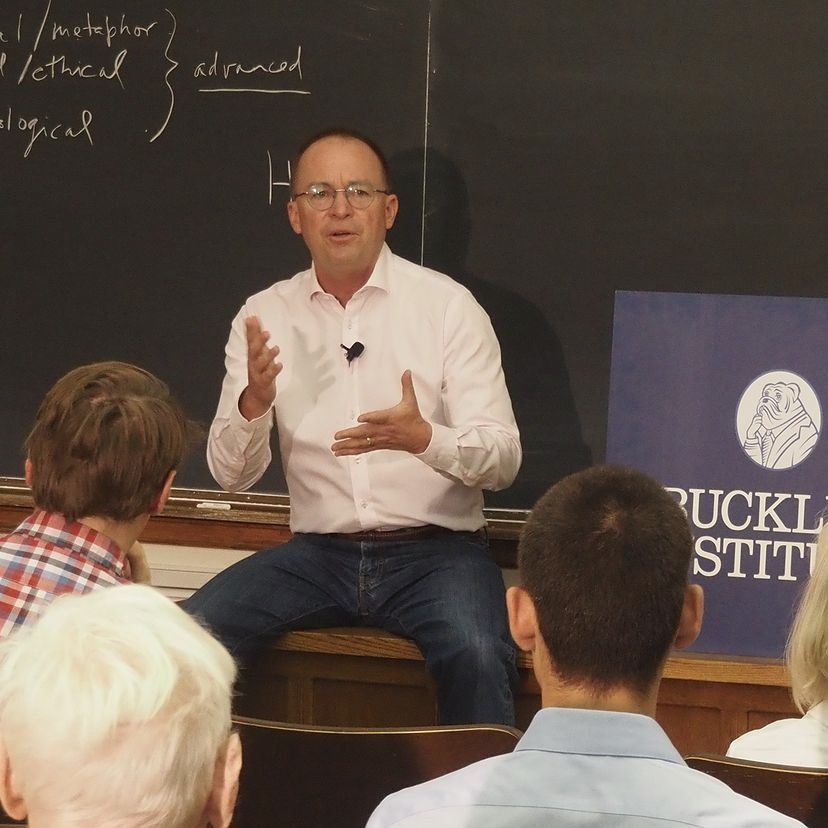‘The first university in the United States to invite me to speak’: Mulvaney talks free speech, political bias at Buckley event
Former White House Chief of Staff Mick Mulvaney spoke about his experiences working in the White House and with political discourse and compromise at a Sept. 12 event organized by the Buckley Institute.

On Tuesday, former White House Chief of Staff Mick Mulvaney sat perched on a desk at the front of a classroom in William L. Harkness Hall for a talk organized by the Buckley Institute.
“This is the first university in the United States to invite me to speak,” Mick Mulvaney said at the start of his presentation.
The audience erupted into applause.
The Buckley Institute — an organization dedicated to “promoting intellectual diversity and free speech” at Yale — invited Mulvaney to speak on “Civil Discourse in an Age of Incivility.”
Kevin Zhong ’24, who attended the event, told the News that Mulvaney was a “phenomenal speaker.”
“He’s such a sharp person,” Zhong said. “He is great at building narratives and stories that show a scene, injecting humor into it and using that to illustrate his point.”
Mulvaney acted as White House Chief of Staff from January 2019 to March 2020. Prior to that role, Mulvaney served as director of the Office of Management and Budget under former president Donald Trump starting in February 2017 and was the U.S. representative of the 5th District of South Carolina before that.
Currently, Mulvaney is a co-chair at Actum LLC, a global consultancy firm.
“Mr. Mulvaney was invited to Yale by the Buckley Institute because he has a wealth of diverse experience across the highest levels of government, unique personal insight into some of the most prominent political figures of our day, and his message encourages good faith efforts to understand and engage those with whom you disagree,” Trevor MacKay ’25, membership director of the William F. Buckley, Jr. Program, told the News.
The event focused on how to handle those with different political beliefs and what compromise means today. Mulvaney engaged audience members throughout his talk and later took questions.
Mulvaney began by expressing fear of a future in which collaboration becomes impossible due to unwillingness to talk to peers with differing political beliefs.
“We can’t deal with our issues in this generation if you can’t talk to people with different viewpoints and compromise,” Mulvaney said during his talk.
He added that political dialogue is also difficult because of the presumptions people make before beginning conversation. He said others often think that because he is a Republican, Mulvaney is a “white supremacist, women-hating, anti-abortionist.”
Mulvaney also spoke about how he has handled compromise, especially as a politician.
However, he said that he is concerned about how the definition of compromise has changed in recent years.
“The word compromise doesn’t mean what it used to mean,” Mulvaney said. “I’m counting on your generation to fix it because we messed it up.”
Mulvaney also talked about corruption within the government, especially concerning money.
Zhong told the News that Mulvaney’s anecdotes regarding corruption undermined his faith in institutions, and “even in humanity, to some extent.”
“It’s obvious that this is not anything new,” Zhong said. “We know this has been happening, but to hear it from the horse’s mouth and to have it described in the entertaining and effective way that he did was very stirring for me.”
After his talk, Mulvaney opened the floor to questions, and many audience members took the opportunity to ask him about his views on free speech.
One attendee asked Mulvaney how to approach “political bias” in the classroom.
“You shouldn’t really give a shit,” Mulvaney said. “Never change your answer to what a teacher wants to hear if it is a philosophical or opinion-based belief. People will not judge you based on your grades. What you bring to the table matters.”
Mulvaney also spoke of his relationship with Trump and said that he is not “a big Donald Trump fan,” adding that he was “never going to be friends” with him.
On Truth Social, a social media platform created by Trump in 2021, Trump once called Mulvaney a “born loser,” to which Mulvaney responded “four” — the number of times Trump hired him.
Another student asked Mulvaney about how to cut spending in the United States.
“It’s really hard to tell people ‘no,’ because it’s not your money,” Mulvaney said. “D.C. is set up for increasing spending. Not a single person has lost their job for spending money.”
He added that the most expensive thing in Washington, D.C. is bipartisanship because “the only thing we can agree on is spending money.”
At one point during the talk, a student asked Mulvaney “what went wrong” to lead to political extremism in the media.
Mulvaney said that financial incentives are responsible.
“Bipartisanship doesn’t sell,” Mulvaney said. “Cooperation doesn’t sell. There is a great deal of money and fame to come out of outrage. There is money to be made on the outside.”
However, in the end, Mulvaney said he is hopeful for the future.
Mulvaney spoke about the state of media and politics, and about whether a solution to political polarization is possible.
“We are not doomed as long as this doesn’t go on for too long. I’m not sure that my generation has the time to figure this out; I hope yours does.”
The Buckley Institute is holding its Seventh Annual Disinvitation Dinner, featuring Jordan Peterson, on Sept. 27 at the Plaza Hotel in New York City.







